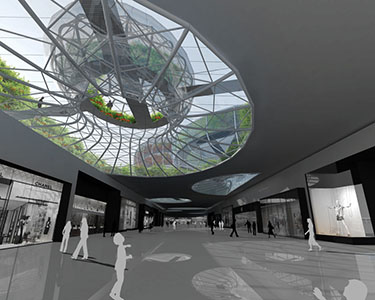
FAYETTEVILLE, Ark. — The University of Arkansas Community Design Center’s project Fayetteville 2030: Food City Scenario has won a 2015 Honor Award in the Analysis and Planning category from the American Society of Landscape Architects. The project seeks to build food sustainability by promoting local urban agriculture.
Food City Scenario is featured in the October issue of Landscape Architecture Magazine and will be exhibited at the ASLA Annual Meeting and Expo in Chicago in November. This is the Community Design Center’s seventh ASLA Honor Award.
The Community Design Center led an interdisciplinary team at the University of Arkansas for Food City Scenario, which speculates on what Fayetteville might look like if the city’s growth integrated local urban food production sustainable enough to create self-sufficiency. Fayetteville’s population of 75,000 is expected to double over the next 20 years. In addition, although the region is the most prosperous in the state, it also has one of the nation’s highest child hunger rates.
Food City Scenario is an urban agricultural project that aims to weave agricultural urbanism back into the city environment, with the prospect of helping Fayetteville achieve greater food security and resiliency, said Steve Luoni, director of the Community Design Center and a Distinguished Professor.
The project is a collaborative plan and policy platform involving the Fay Jones School of Architecture and Design, Department of Biological and Agricultural Engineering, Center for Agricultural and Rural Sustainability, School of Law and Master of Laws Program in Agricultural and Food Law, Department of Food Science, and the city of Fayetteville.
Preparation of Food City was sponsored in part by a grant from the Clinton Global Initiative and the American Institute of Architects under their Decade of Design initiative.
“Food City radicalizes planning discourse by centralizing the role of nutrition in creating healthy communities,” Luoni said. “Keeping in mind that cities and agriculture are energy systems, we can readily devise novel resilient and self-sufficient city forms that exponentially multiply ecological and economic capital. We are most pleased that all of the major design professions and national foundations focused on resilience have now embraced the important discussion surrounding agricultural urbanism.”
The Food City Scenario project previously received a 2015 Great Places Award in the Planning Category from the Environmental Design Research Association, as well as a 2015 Green Good Design Award and a 2014 American Architecture Award, both from The European Centre for Architecture Art Design and Urban Studies and The Chicago Athenaeum: Museum of Architecture and Design. It also won an Honorable Mention in the 2014 Progressive Architecture Awards program, as well as an Award of Merit in the category for Planning Tool or Process in the 2014 Charter Awards program from the Congress for the New Urbanism.
About the University of Arkansas Community Design Center: The University of Arkansas Community Design Center was founded in 1995 as part of the Fay Jones School of Architecture and Design. The center advances creative development in Arkansas through education, research, and design solutions that enhance the physical environment. It has provided design and planning services to more than 50 communities and organizations across Arkansas, helping them to secure nearly $65 million in grant funding to enact suggested improvements. In addition to revitalizing historic downtowns, the center addresses new challenges in affordable housing, urban sprawl, environmental planning, and management of regional growth or decline. The center’s professional staff members are nationally recognized for their expertise in urban and public-interest design, and their work has received more than 100 design and planning awards. For more information visit http://uacdc.uark.edu.
About the University of Arkansas: The University of Arkansas provides an internationally competitive education for undergraduate and graduate students in more than 200 academic programs. The university contributes new knowledge, economic development, basic and applied research, and creative activity while also providing service to academic and professional disciplines. The Carnegie Foundation classifies the University of Arkansas among only 2 percent of universities in America that have the highest level of research activity. U.S. News & World Report ranks the University of Arkansas among its top American public research universities. Founded in 1871, the University of Arkansas comprises 10 colleges and schools and maintains a low student-to-faculty ratio that promotes personal attention and close mentoring.
Topics
Contacts
Steve Luoni, director
Community Design Center
479-575-5772, sluoni@uark.edu
Mattie Bailey, communications intern
Fay Jones School of Architecture and Design
479-575-4704, mxw030@uark.edu